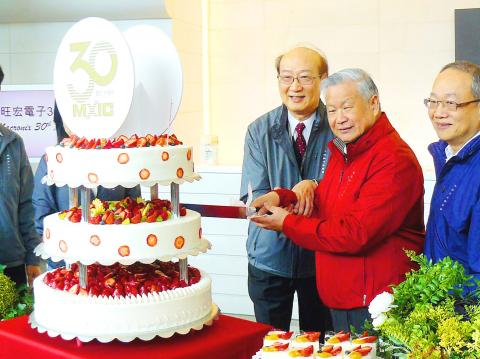Memorychip maker Macronix International Co (旺宏) yesterday said that it is shipping high-density memory chips for Huawei Technologies Co’s (華為) 5G base stations and expects client demand for the chips to peak next year or in 2021 in step with the global deployment of the next-generation wireless networks.
Other than Huawei, “80 percent of the [world’s] 5G companies are adopting our chips as well. Those [clients] are from China, Japan, Europe and South Korea,” Macronix chairman Miin Wu (吳敏求) told reporters at the company’s headquarters in Hsinchu.
“I believe the company is a major supplier to those [5G] clients,” he added.

Photo: CNA
As global telecom operators are just beginning to install base stations this year, shipments of Macronix’s memory chips used in 5G base stations are expected to peak next year, or the year after, Wu said.
He said that 5G base stations are expected to require a significant amount of memory chips, as they are usually equipped with high-density NOR flash with 1 or 2 gigabytes of memory.
Not only 5G technology, but also true wireless stereo earbuds are driving demand for memory chips and boosting memorychip prices, Wu said.
“Based on the information on hand, I think [prices] will grow mildly. The semiconductor looks quite good... There is room for price increases in the second half next year,” he said. “Demand for NOR flash and NAND flash memory chips should surpass supply sometime next year.”
Macronix expects demand to improve every quarter next year, he said.
Macronix, which turned 30 earlier this month, plans to ship its first 3D 48-layer NAND flash memory chips in the second half of next year, with the first batch going to Nintendo Co.
The chipmaker said that 3D 96-layer NAND flash memory chips would follow in 2021 and 192-layer chips in 2022.
To celebrate its 30th anniversary, Macronix is exhibiting innovative technologies and products — such as chips used in autonomous vehicles, automated external defibrillators, Fibit Inc’s smart watches, drones and Nintendo Co’s Switch game consoles — in a new showroom at its headquarters.
The company aims to grow its revenue from medical, industrial and automobile devices to make up 50 percent of the company’s revenue in the long term, compared with the current 25 percent, Wu said.
Macronix invests 15 percent of its annual revenue in research and development (R&D) and had 7,950 patents granted as of October, the company said, adding that about 20 percent of its 40,000 employees are R&D staff.
Macronix said that it would give a NT$10,000 (US$328) bonus to each employee to celebrate its anniversary.
In other words, it would pay a total of NT$40 million in bonuses, which Wu said reflected the company’s gratitude for the contribution made by its employees and support from their families.
The company reported earnings per share of NT$4.94 for last year and NT$1.21 per share for the first three quarters of this year.
Revenue for last month decreased 6 percent to NT$3.66 billion, from NT$3.89 billion a year earlier. In the first 11 months, cumulative revenue totaled NT$29.08 billion, 9 percent less than the NT$31.87 billion reported for the same period last year.
Additional reporting by CNA

Anna Bhobho, a 31-year-old housewife from rural Zimbabwe, was once a silent observer in her home, excluded from financial and family decisionmaking in the deeply patriarchal society. Today, she is a driver of change in her village, thanks to an electric tricycle she owns. In many parts of rural sub-Saharan Africa, women have long been excluded from mainstream economic activities such as operating public transportation. However, three-wheelers powered by green energy are reversing that trend, offering financial opportunities and a newfound sense of importance. “My husband now looks up to me to take care of a large chunk of expenses,

SECTOR LEADER: TSMC can increase capacity by as much as 20 percent or more in the advanced node part of the foundry market by 2030, an analyst said Taiwan Semiconductor Manufacturing Co (TSMC, 台積電) is expected to lead its peers in the advanced 2-nanometer process technology, despite competition from Samsung Electronics Co and Intel Corp, TrendForce Corp analyst Joanne Chiao (喬安) said. TSMC’s sophisticated products and its large production scale are expected to allow the company to continue dominating the global 2-nanometer process market this year, Chiao said. The world’s largest contract chipmaker is scheduled to begin mass production of chips made on the 2-nanometer process in its Hsinchu fab in the second half of this year. It would also hold a ceremony on Monday next week to

TECH CLUSTER: The US company’s new office is in the Shalun Smart Green Energy Science City, a new AI industry base and cybersecurity hub in southern Taiwan US chip designer Advanced Micro Devices Inc (AMD) yesterday launched an office in Tainan’s Gueiren District (歸仁), marking a significant milestone in the development of southern Taiwan’s artificial intelligence (AI) industry, the Tainan City Government said in a statement. AMD Taiwan general manager Vincent Chern (陳民皓) presided over the opening ceremony for the company’s new office at the Shalun Smart Green Energy Science City (沙崙智慧綠能科學城), a new AI industry base and cybersecurity hub in southern Taiwan. Facilities in the new office include an information processing center, and a research and development (R&D) center, the Tainan Economic Development Bureau said. The Ministry

State-run CPC Corp, Taiwan (CPC, 台灣中油) yesterday signed a letter of intent with Alaska Gasline Development Corp (AGDC), expressing an interest to buy liquefied natural gas (LNG) and invest in the latter’s Alaska LNG project, the Ministry of Economic Affairs said in a statement. Under the agreement, CPC is to participate in the project’s upstream gas investment to secure stable energy resources for Taiwan, the ministry said. The Alaska LNG project is jointly promoted by AGDC and major developer Glenfarne Group LLC, as Alaska plans to export up to 20 million tonnes of LNG annually from 2031. It involves constructing an 1,290km